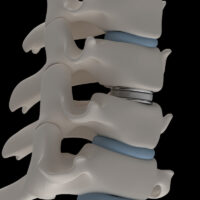ADR Can Yield Better Results than Fusion, so Why Do Insurance Companies Try to Deny It?

Artificial Disc Replacement (ADR) surgery has existed as an alternative to spinal fusion for over 30 years. Many doctors and researchers will attest that ADR provides more successful outcomes for patients than spinal fusion, offering a shorter recovery period and reducing the likelihood that patients will need additional surgical procedures in the future. ADR has become the favored method of addressing painful damaged spinal discs in many countries across the globe, but it remains a struggle for Americans to obtain approval from their insurers to undergo ADR instead of spinal fusion.
Spinal fusion prone to further back problems
Spinal fusion was once the favored option for surgical treatment of degenerative disc disease. The procedure involves fusing two adjacent vertebrae together. The procedure often results in patients spending over a year recovering from the procedure. Tragically, many spinal fusion patients need follow-up surgical procedures after the spinal fusion, since fusing vertebrae together causes the neighboring vertebrae to suffer an unnatural amount of torque and strain.
Decades later, insurance companies still claim ADR is experimental
ADR has had widespread approval from regulatory agencies for years, but it still gets labeled as an “experimental” procedure by many insurers. The Charite was the first ADR device to be approved by the FDA, which occurred in 2004. Since that time, the FDA has approved numerous other ADR devices manufactured by a variety of medical device makers. As with many innovative medical devices, subsequent research and patient reports exposed serious design flaws in the Charite device, leading to the device being recalled in 2011. Despite the fact that many other devices have been introduced to the ADR market since this time, many insurers continue to cite the Charite device as one basis for labeling the procedure “experimental.” The relative newness of ADR, when compared to spinal fusion, is another reason that ADR is labeled “experimental,” but, considering that the procedure has had FDA approval for nearly 15 years, this argument is growing increasingly thin.
Fight for the right treatment for your back problems
Our law firm has been on the forefront of fighting for patients seeking coverage of their ADR surgeries. Our experienced bad faith insurance law attorneys sued Anthem Inc. on behalf of its policyholders for categorically denying all claims for two-level cervical artificial disc replacement surgery on the grounds that the procedure was “investigational.” In November 2018, we obtained approval of a settlement on behalf of the class that will provide thousands of dollars of reimbursement for individuals who were excellent candidates for ADR surgery but were forced to pay out of pocket when Anthem denied their claim for coverage. Our attorneys are continuing to fight for coverage of ADR surgeries for individuals who could avoid needless additional pain and surgery by undergoing this procedure instead of spinal fusion.
Call Gianelli & Morris if Your Claim for Coverage is Denied
If you’ve been the victim of a wrongful denial of a health insurance claim in California, get help seeking the coverage you deserve by contacting the experienced and effective Los Angeles bad faith insurance lawyers at Gianelli & Morris for a free consultation at 213-489-1600.
